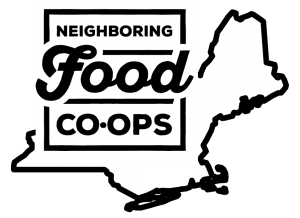 Your Neighboring Food Co-ops
Your Neighboring Food Co-ops
Locally Owned by More Than
150,000 People Like You!
In this Month’s E-News, check out:
- Co-op Month: Co-ops By the Community, For the Community
- Take Action for Co-ops!
- Co-op IMPACT 2019: Power In Purpose
- Farm to Freezer: Autumnal Baking
- October’s Cave to Co-op Cheese Special
- Farmers Union: Fall Fly-In
- Our Neighborhood Co-op Calendar
Co-op Month: Co-ops By the Community, For the Community
Co-ops: For the Community, By the Community
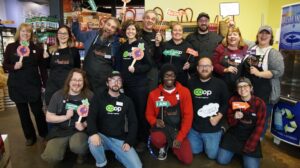
This October, our Neighboring Food Co-ops are celebrating Co-op Month with more than 40,000 co-operatives and credit unions across the US. This year’s theme, “Co-ops: By the Community, For the Community,” promotes how co-operative business create ways for us to work together to meet our needs and build stronger communities.
Here are some of the special activities NFCA co-ops have been doing to celebrate Co-op Month: from in-store events, special sales and membership drives, to community activities…and more:
- Blue Hill Co-op (ME) did a “Co-op Poll” to raise their members’ awareness about the other co-operative businesses they belong to/participate in.
- Brattleboro Food Co-op and Middlebury Natural Foods Co-op (VT) are featuring co-op produced products and NFCA Frozen veggies in their in-store demos.
- City Market/Onion River Co-op‘s (VT) donation programs this month is raising over $23,000 for food security and youth programs!
- Co-ops went on the airwaves to share the Co-op Difference including River Valley Co-op and Franklin Community Co-op on the WHMP Bill Newman show focusing on co-operatives.
- Dorchester Food Co-op (MA) startup is working to reach their spring goal of founding member-owners using Co-op Month information in their newsletter.
- Franklin Community Co-op‘s (MA) “Miles of Co-operation” features local co-op producers and organizations in this public event.
- Twenty seven co-operatives of different types participated in a group print ad in the Greenfield Recorder and Valley Advocate, including seven NFCA co-ops.
- Littleton Food Co-op (NH) features La Riojana Co-operative wines in multiple tastings this month.
- Monadnock Food Co-op (NH), is honoring a Co-operator of the Year at their Annual Meeting, donating to the Howard Bowers Fund, as well as contributing Round Up donations to Community Garden Connections.
- Neighboring Food Co-ops showed off their Co-op Pride into the Co-op Month Photo Competition
- Old Creamery Co-op (MA) has multiple opportunities for the community to Meet and Greet with their Interim General Manager, and features co-op produced products on sale all month.
- Portland Food Co-op (ME) has all products made by co-ops on sale, all month.
- Willimantic Food Co-op (CT) is encouraging education about Co-operative Principles with a call for essays which they will compile in a “Cooperative Essay Collection.”
How is your Co-ops celebrating their identity and reminding your community the many ways our co-ops are “By the Community, For the Community”?

Thanks to CoBank for their support of our Neighboring Food Co-ops
Call your Representative and ask them to cosponsor House Resolution 602, commending “the co-operative business model for its contributions to the Nation’s and the world’s economy, the jobs it creates, and its social impacts on the communities in which they operate.”

Co-operators are invited to call (202)224-3121 for the Capitol switchboard.Then, based on your zip code, you’ll transferred to your U.S. Representative. Calling your representative takes only a few minutes. Below is a sample script that you can use for you call:
“Hello, my name is [YOUR NAME]. I’m a constituent and a member of [YOUR CO-OP], which is part of the Neighboring Food Co-op Association, a network of food co-ops and startup initiatives locally owned by 150,000 people across the Northeast.
I’m calling to ask Representative [NAME OF REPRESENTATIVE] to cosponsor House Resolution 602, introduced by Representatives Mark Pocan and Paul Gosar, which recognizes the contributions of co-ops to their communities and the economy. Resolution 602 commends co-operative enterprise for its ability to generate jobs, build local economies, and enable people to meet their own needs and improve their communities, together. I hope you will cosponsor this important resolution.
Thank you!”
Phone calls are the best way to get in touch with your legislators in a timely way. However, if you prefer to send an e-mail, you can visit house.gov and type in your zip code to access your Representative’s website.
House Resolution 602 is an excellent opportunity for co-op members to shine a light on the impact of co-operative enterprise — especially during Co-op Month. Please take a few minutes to take action, and then share this alert with your friends.
Now Offering Personal Impact Deposit Accounts

Open an account today and help increase access to local, healthy food, deliver health care to more people, create affordable housing and build renewable energy. Your Choices Reflect Your Values. Your Bank Should Too. Check our rates and Open an Account today.
Co-op IMPACT 2019: Power In Purpose
Co-op Month got off to a great start this year with the 3rd annual Co-op IMPACT Conference, organized by the National Cooperative Business Association, CLUSA International (NCBA CLUSA).
Held in Arlington, VA, the conference brought together more than 400 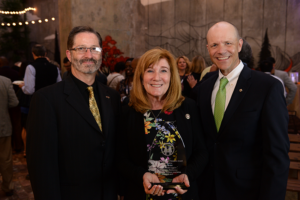 representatives from co-operatives and co-operative associations, non-profit developers, funding organizations, and community groups for three days of panels, workshops, and presentations designed to reenergize the co-operative movement around building the next economy with “power in purpose.”
representatives from co-operatives and co-operative associations, non-profit developers, funding organizations, and community groups for three days of panels, workshops, and presentations designed to reenergize the co-operative movement around building the next economy with “power in purpose.”
Erbin Crowell, Executive Director of the Neighboring Food Co-op Association (NFCA) and Chair of the NCBA CLUSA Board of Directors welcomed attendees, noting that, “as co-operators, we are driven by a particular purpose. Certainly, part of the purpose is to create, grow, and sustain successful, member-owned co-operative enterprises. But we are also driven by a vision for a better world – one that is more equitable, just, and sustainable. And there is power in this purpose – power to engage and inspire, and to offer hope, to empower people to work together to build better lives and communities.”
Conference keynote Felicia Wong, President and CEO of the Roosevelt Institute, emphasized that “building an inclusive economy is not just the right thing to do; it’s the smart thing to do.” No longer met with “polite nods” from the political and business elite, the ideals and principles of co-operation are provoking genuine interest — a “tectonic shift among stakeholder priorities,” Wong said.
The co-operative community should recognize this shift as “an invitation to be part of the larger conversation,” said NCBA CLUSA President and CEO Doug O’Brien. This year’s conference marked a key opportunity to broaden that conversation, with four tracks, 40 sessions and 93 speakers over the three-day event. Seesions also tied into the Fall issue of the Cooperative Business Journal, which reflects on what the next economy could look like, and the steps needed to get there: education, advocacy and policy.
During the conference, Bette Brand, Administrator of the U.S. Department of Agriculture (USDA)’s Rural Business-Cooperative Service, received NCBA CLUSA’s Cooperative IMPACT Champion Award during a reception at REI Co-op’s Washington, DC Flagship Store. Co-ops are eager to benefit from USDA’s portfolio of co-op programs, and USDA is “working to open that line of communication,” she said. (Pictured above are Erbin Crowell and Doug O’Brien presenting Brand with the award.)
Conference attendees heard keynotes from Kimberly Rosen, Deputy Assistant Administrator at the U.S. Agency for International Development (USAID)’s Bureau for Economic Growth, Education and Environment; and Martin Chrisney, Senior Director of KPMG International, who said co-ops have the capacity to achieve the United Nations Sustainable Development Goals. Friday marked the first time the Co-op IMPACT Conference has offered a full day of international programming, featuring three tracks: Sustainability and Self-Reliance, Stability and Innovations in Co-op Development.
The NCBA CLUSA Board of Directors also met during the conference, approving a Resolution on Diversity, Equity and Inclusion that amplifies the organization’s commitment these priorities as an integral part of the Co-operative Identity. Building on the adoption of the organization’s vision for the role of co-operatives in building a more inclusive economy in 2017, the resolution also positioned NCBA CLUSA to engage in dialogs at the International Co-operative Alliance’s International Conference on Co-operatives for Development in Kigali, Rwanda, in October.
(Thanks to NCBA CLUSA for content contributing to this article.)

Thanks to Cooperative Development Foundation for their support of our Neighboring Food Co-ops
Farm to Freezer: Autumnal Baking
Autumnal Baking: with Local Peas?!
Autumn in the Northeast means cooler weather and baking becomes  desirable. Oven warmth and tantalizing smells fill the kitchen air when herbs and spices are used in preparation.
desirable. Oven warmth and tantalizing smells fill the kitchen air when herbs and spices are used in preparation.
When you cook from scratch, you save on food costs by substituting your time. But we sometimes get deterred by lengthy prep time, though wanting to try creative and interesting foods. This Samosa recipe is uncomplicated and relatively easy to prepare. Samosas are a traditional Indian food, a turnover filled with minced meat or vegetables and spices, and a great addition to a meal or hearty appetizer. Your local co-op has the spices and ingredients you need for this dish as well as for your special occasion or every-day baking for family meals.
Our farmers have been working hard to bring us fresh fruits and vegetables throughout the season. We can enjoy a variety of local vegetables for healthy family meals and support family farmers all year long by choosing Neighboring Food Co-op Association (NFCA) Blueberries, Organic Edamame, Organic Green Beans, and non-GMO Sweet Corn and Green Peas too— All are all grown and packaged right here in the Northeast, and available only at your food co-op!
Joyce’s Samosas
Samosas can be fried or baked, making the dough from scratch as well. This recipe uses a pre-made puff pastry for the wrapper.
Ingredients
- 2 tablespoons butter
- 1 tablespoon vegetable oil
- ¾ cup chopped onion
- 2 teaspoons garlic, minced
- 1 teaspoon cumin seeds
- ¾ teaspoon curry powder
- ½ teaspoon ground coriander
- ½ teaspoon cayenne powder
- ½ teaspoon garam masala
- 2 ½ cups cooked potatoes (in small cubes)
- ½ cup Farm to Freezer peas
- ¼ cup vegetable stock
- 2 tablespoons lemon juice
- salt & pepper to taste
- 1 ½ sheets puff pastry, thawed
- 1 egg yolk w/1 teaspoon milk, whisked
Instructions
Saute onions in butter and oil until soft. Add ginger and garlic, cook 3 minutes. Stir in spices, cook 1 minute. Add peas, potatoes, veggie stock, cook 5 minutes. Remove from heat and add lemon, salt & pepper. Cool.
Cut puff pastry into 4 ¼ squares. Place scoop of filling on one half. Fold to make a triangle, pinching edges to seal. Brush with egg wash. Bake at 375 degrees for 17 minutes. Serve warm.
For more Farm to Freezer information and recipes — including warm weather recipes great for summer meals using frozen corn, peas, edamame, or blueberries — visit: www.nfca.coop/farmtofreezer.
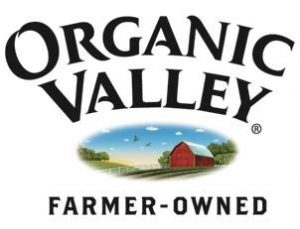
Thanks to Organic Valley for their support of our Neighboring Food Co-ops
October’s Cave to Co-op Cheese Special
Cabot Clothbound Cheddar, aged at The Cellars at Jasper Hill, Greensboro, VT
In 1919, 94 farmers from the communities around Cabot, Vermont joined forces to purchase the village creamery and began producing butter and 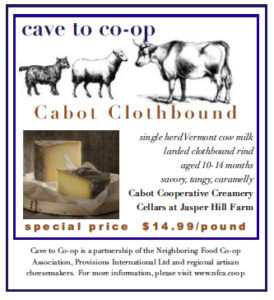 shipping fluid milk as a Dairy Co-operative. Over the next two decades, the Co-op thrived. In 1930, cows outnumbered people in Vermont by 421,000 to 359,000. That same year, Cabot began making cheese. By 1960, 600 farm families had joined Cabot Co-operative. But as the years went by the number of farms in Vermont diminished and in the 1980s sunk below 2000, less than one fifth of what it had been just a few decades before. In 1992, Cabot Co-op joined forces with Agri-mark, a southern New England Co-op dating back to 1918. Today the combined Co-ops include more than 1,200 farms in New England and upstate New York.
shipping fluid milk as a Dairy Co-operative. Over the next two decades, the Co-op thrived. In 1930, cows outnumbered people in Vermont by 421,000 to 359,000. That same year, Cabot began making cheese. By 1960, 600 farm families had joined Cabot Co-operative. But as the years went by the number of farms in Vermont diminished and in the 1980s sunk below 2000, less than one fifth of what it had been just a few decades before. In 1992, Cabot Co-op joined forces with Agri-mark, a southern New England Co-op dating back to 1918. Today the combined Co-ops include more than 1,200 farms in New England and upstate New York.
In 2003, Cabot Creamery asked Jasper Hill Farm to age a special batch of English-style clothbound cheddar. Once unmolded from their shaping hoops, the wheels are individually wrapped and aged for 10-14 months. The extra care involved in curing a clothbound cheese requires a customized aging environment, with proper temperature, humidity, and airflow.
Cabot Co-operative Clothbound Cheddar is best enjoyed on its own with a slice of crisp new apple or pear. It has all the characteristic texture of an English-style bandaged cheddar; smooth and dense, slightly brittle, with the sweet caramel and milky flavors that set it apart from other clothbound varieties. It is simultaneously sweet, savory, nutty and tangy.
Get Recipes using Cabot Clothbound: https://nfca.coop/cave-to-co-op-october-2019/
Cave to Co-op is a partnership between Provisions International and the Neighboring Food Co-op Association (NFCA) to support artisanal cheese producers in our region and make their products more easily available to co-op shoppers. Each month, a delicious local cheese is featured at a great price. For more information on Cave to Co-op, visit: www.nfca.coop/CaveToCo-op

Thanks to New England Farmers Union for their support of our Neighboring Food Co-ops
Family Farmers & Food Co-op Partners Advocate for Stronger Agricultural Policy
After yet another year of depressed commodity prices, uncertainty in export 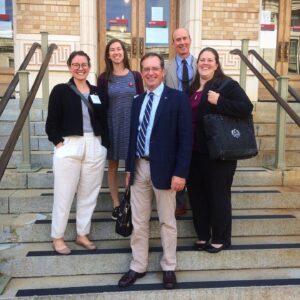 and biofuels markets, rapid consolidation in the food and agriculture sectors, and extreme and unseasonal weather events, nearly 400 of National Farmers Union’s (NFU) family farmer and rancher members traveled to Washington, D.C., last month to meet face-to-face with administration officials and members of Congress.
and biofuels markets, rapid consolidation in the food and agriculture sectors, and extreme and unseasonal weather events, nearly 400 of National Farmers Union’s (NFU) family farmer and rancher members traveled to Washington, D.C., last month to meet face-to-face with administration officials and members of Congress.
“In early September, most farmers are busy harvesting, planting winter crops, and attending to livestock,” said NFU President Roger Johnson. “The fact that nearly 400 joined us in DC to advocate better food and agricultural policy speaks volumes to how exceptionally challenging things are right now in farm country.”
As part of our commitment to partnership with our region’s family farmers on food system advocacy, the Neighboring Food Co-op Association (NFCA) worked with the New England Farmers Union to send representatives from member food co-ops on the Fly-In, including Allan Reetz, Director of Public & Government Affairs, and Rebecca White, Produce Manager, from Hanover Co-op Food Stores (NH & VT), and Charlotte Ross, organic vegetable farmer and member of the Board of Directors of Willimantic Food Co-op (CT). Also joining the Northeast delegation were Roger Noonan, President of New England Farmers Union and organic vegetable farmer from New Hampshire; Mary Castonguay, New England Farmers Union Vice President and organic dairy farmer from Livermore, Maine; Bethany Davis, Director of Advocacy and Government Relations for Megafood and President of the Coalition for Supplement Sustainability; Karl Schatz, a goat farmer, agritourism operator, and communications professional from Gray, Maine; and Eric Scheffer, an organic dairy farmer from Hoosick Falls, New York.
“There’s an old saying in the world of government affairs that goes; If you’re not showing up to share your views, someone else will share theirs in your absence,” said Allan Reetz of Hanover Co-op Food Stores. “Our work with the NFCA and the Farmers Union is a key component to our advocacy on issues important to our food co-ops and our region’s family farms.”
“For several years, farm commodity prices have been below the cost of production, which means that most farmers are selling at a loss and are rapidly losing equity. At the same time, a recent wave of agribusiness megamergers has pushed up input costs,” said NFU President Roger Johnson. “Many producers have been forced to take out more loans just to keep their doors open, causing farm debt to balloon to record levels. All of this has been compounded by a never-ending global trade war and the ongoing subversion of the Renewable Fuel Standard, both of which have wiped out critical markets for farmers and ranchers. If that weren’t enough, climate change has thrown weather patterns out of whack, making it that much more difficult to grow crops and raise livestock.”
In this context, Fly-In participants from across the country campaigned for policies that strengthen the farm safety net, reduce chronic overproduction, help farmers and ranchers implement climate smart practices, restore competition to the agricultural economy, resolve ongoing trade disputes, and expand the market for homegrown biofuels.
A key talking point for the New England delegation was also the Main Street Employee Ownership Act, which would provide access for co-ops to Small Business Administration (SBA) lending and other services. The NFCA played a key role in the drafting of this legislation and has been mobilizing food co-op members to push for the implementation of provisions supporting co-operative development.
“In conversation with law makers, it was natural for me to bring the co-operative business model into the conversation as a piece of the solution,” said Rebecca White of Hanover Co-op Food Stores. “In addition to raising the profile of our local co-ops and stressing the importance of building relationships between consumers and farmers, I spoke about improving access to capital and technical assistance for beginning co-ops and for small businesses transitioning to co-operative ownership through the Main Street Employee Ownership Act. I was also happy to bring attention to the proposed Moratorium on Food and Agribusiness Mergers, which would bring the focus back to creating successful and sustainable food systems.”
“Given the current circumstances, it is more important than ever that legislators hear directly from family farmers and ranchers about the issues they’re dealing with,” said Johnson. “NFU members want Congress to understand the financial and environmental realities of modern agriculture, and they want to provide recommendations for what meaningful solutions look like. We hope that long after Fly-In attendees return to their farms and their communities, their elected representatives will use these conversations to write policies that bolster rural America and family farm agriculture.”
The three-day event began with a briefing at the U.S. Department of Agriculture (USDA) and continued with presentations by industry experts and agricultural policy specialists on the farm economy, corporate consolidation, international trade, and biofuels. NFU members then took to Capitol Hill to meet in small-group meetings with all 535 congressional offices, and to present congressional champions of family agriculture with the Golden Triangle Award, the group’s highest legislative honor.
* * * *
The New England Farmers Union Needs You!
If you care about where your food comes from and want to support the people who produce it, consider joining NEFU as a Friend of the Farmer for just $15. Your membership will help ensure that our region’s producers and consumers are heard by policy makers here at home and in Washington, DC. For more information, please visit www.newenglandfarmersunion.org.
The Neighboring Food Co-op Association (NFCA) is an affiliate member of the New England Farmers Union (NEFU), representing our commitment to collaboration among consumers and our region’s family farmers and fishermen to influence food system policy and build a more vibrant, resilient and co-operative food system in the Northeast.
Our Neighborhood Co-op Calendar

Enhancing Co-operative Business Performance: How to Strengthen Identity, Loyalty & Participation is an interactive intensive professional development training focused on leading thinking in co-operative management coupled with tangible examples of how to translate knowledge into action.
Offered in collaboration with the International Centre for Co-operative Management at Saint Mary’s University and delivered by Professor Daniel Côté, this is a unique learning and networking opportunity for co-op and credit union professionals.
For more information, visit: https://nfca.coop/events
For More Co-op Events, Visit https://nfca.coop/calendar
OCTOBER 2019
OCTOBER IS CO-OP MONTH!
Oct 24-25
Saint Mary’s University Co-op Executive Education Training, Greenfield, MA
Enhancing Business Performance through Co-operative Management Practices
Hosted by the NFCA
DECEMBER 2019
Dec 21
175th Anniversary of the founding of the Rochdale Society of Equitable Pioneers, 1844.
JANUARY 2020
Sat, Jan 11
NOFA MASS Winter Conference
https://www.nofamass.org/events/wc
Thurs-Sun, Jan 17-19
NOFA NY Winter Conference
https://nofany-winterconference.squarespace.com/
FEBRUARY 2020
Sat, Feb 8
NOFA NH Winter Conference
https://www.nofanh.org/winterconference
Sat-Mon, Feb 15-17
NOFA VT Winter Conference
https://nofavt.org/conference
MARCH 2020
Sat, Mar 7
NOFA CT Winter Conference
https://organiconn.squarespace.com/
Mar 21
9th Annual Meeting of the Neighboring Food Co-op Association (NFCA)
The Neighboring Food Co-op Association (NFCA) is a co-operative federation of 35 food co-ops and start-up initiatives across New England, working together toward a shared vision of a thriving co-operative economy, rooted in a healthy, just, and sustainable food system and a vibrant community of co-operative enterprise.

